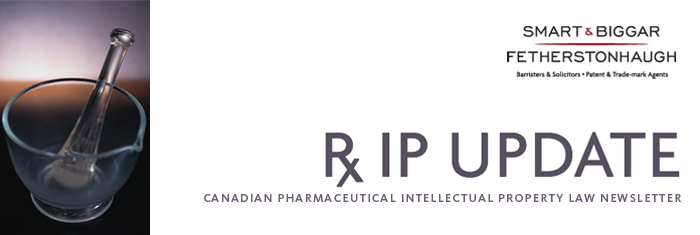 |
|||||||||||||||||||||||||||||||||||||||||||||||||||||||||||||||||||||||||||||||||||||||||||||||||||||||||||||||||||||||||||||||||||||||||||||||||||
|
|
October 2011 In this issue: AstraZeneca granted prohibition Order for anastrozole » U.S. Federal Trade Commission releases final report on authorized generic drugs » Supreme Court of Canada news » |
||||||||||||||||||||||||||||||||||||||||||||||||||||||||||||||||||||||||||||||||||||||||||||||||||||||||||||||||||||||||||||||||||||||||||||||||||
|
AstraZeneca granted prohibition Order for anastrozole On August 29, 2011, Justice Rennie of the Federal Court granted AstraZeneca an order prohibiting the Minister of Health from issuing a Notice of Compliance ("NOC") to Mylan Pharmaceuticals ULC for a generic anastrozole product: AstraZeneca Canada Inc. et al v. Mylan Pharmaceuticals ULC et al, 2011 FC 1023. |
|||||||||||||||||||||||||||||||||||||||||||||||||||||||||||||||||||||||||||||||||||||||||||||||||||||||||||||||||||||||||||||||||||||||||||||||||||
|
U.S. Federal Trade Commission releases final report on authorized generic drugs On August 31, 2011, the United States Federal Trade Commission issued a final report on authorized generic drugs, "Authorized Generic Drugs – Short-Term Effects and Long-Term Impact." An authorized generic is a lower-cost, generic-label version of a brand-name drug that is already sold by the same manufacturer. The report examines how competition and drug prices are affected by authorized generics. |
|||||||||||||||||||||||||||||||||||||||||||||||||||||||||||||||||||||||||||||||||||||||||||||||||||||||||||||||||||||||||||||||||||||||||||||||||||
|
Supreme Court of Canada news Teva's leave application to clarify scope of section 8 damages dismissed. As reported in the July 2011 edition of Rx IP Update, Teva sought leave to appeal to the Supreme Court the decision of the Federal Court of Appeal upholding the Federal Court decision to strike portions of Teva's claim. Those paragraphs sought recovery for permanent loss of market share relating to ramipril (sanofi-aventis's ALTACE). The Supreme Court dismissed Teva's leave application. Teva Canada Limited v. Sanofi-Aventis Canada Inc., et al. (SCC Case No. 34325). Good faith requirement for patents in Canada (leave sought). As reported in the August 2011 edition of Rx IP Update, the Federal Court of Appeal in Corlac v. Weatherford, 2011 FCA 228 significantly narrowed the good faith requirement for patents in Canada. On September 28, 2011, Corlac sought leave to the Supreme Court. Corlac Inc. v. Weatherford Canada Ltd. (SCC Case No. 34459). |
|||||||||||||||||||||||||||||||||||||||||||||||||||||||||||||||||||||||||||||||||||||||||||||||||||||||||||||||||||||||||||||||||||||||||||||||||||
|
Health Canada news Health Canada releases draft Guidance Document: "The Use of Foreign Reviews by Health Canada." Recognizing that most market authorization holders currently provide foreign reviews to Health Canada, Health Canada has provided a draft Guidance Document on how it uses these foreign reviews. A pilot phase to test the principles and practices described in the draft Guidance Document will be run from October 2011 through March 2013, and comments may be submitted until March 31, 2013. Health Canada releases its Post-Notice of Compliance (NOC) Changes: Quality Document. Health Canada released a revised Guidance Document: Post-Notice of Compliance (NOC) Changes – Quality Guidance Appendix 1 for Human Pharmaceuticals. The changes will simplify and streamline the process for submitting post-authorization changes in manufacturing or chemistry that require Health Canada approval. The Guidance Document is effective October 17, 2011. Guidance Document: Quality Document; Guidance Document: Framework Document. |
Patent Appeal Board decisions Canadian Patent Office rejects claims to monoclonal antibodies for insufficiency and lack of sound prediction. In Genentech, Inc. Patent Application No. 2,407,304 (Re) (Commissioner's Decision #1314), the Commissioner of Patents further considered the applicant's comments after issuing her decision in #1307 in November 2010. The applicant alleged that it had not been able to fully address two issues: (i) whether the scope of claim 1 in relation to the target polypeptides is overly broad; and (ii) whether there is a sound prediction with respect to use of the claimed antibody as an anti-inflammatory agent. The Commissioner largely followed her previous decision in #1307. In particular, she found that claim 1 is overly broad for including antibodies that recognize a large class of target polypeptides, which polypeptides may bind to unknown ligands and required that the claim be limited to antibodies that cross-react with the particular target polypeptides disclosed. She also found that there is no sound prediction to support the claimed therapeutic utility as an anti-inflammatory agent. |
||||||||||||||||||||||||||||||||||||||||||||||||||||||||||||||||||||||||||||||||||||||||||||||||||||||||||||||||||||||||||||||||||||||||||||||||||
|
New Court proceedings Patented Medicines (Notice of Compliance) Regulations
Other proceedings
To check the status of Federal Court cases, please click here.
|
Contact information For more information or to request a copy of any decision, pleading or legislation, please contact:
Case-law briefs prepared by:
Litigation contacts
Prosecution contacts
Regulatory contacts
Our pharmaceutical practice group Smart & Biggar/Fetherstonhaugh's pharmaceutical practice group calls upon decades of extensive and in-depth experience to keep your pharmaceutical IP rights where they belong — in your hands. For more information on our group and a full list of its members, please click here. Disclaimer The preceding is intended as a timely update on Canadian intellectual property and regulatory law of interest to the pharmaceutical industry. The contents of this newsletter are informational only and do not constitute legal or professional advice. To obtain such advice, please communicate with our offices directly. To join the Rx IP Update mailing list, be removed from the mailing list or make changes to contact information, please send an e-mail to rxip.update@smart-biggar.ca. smart-biggar.ca | Ottawa | Toronto | Montreal | Vancouver | ||||||||||||||||||||||||||||||||||||||||||||||||||||||||||||||||||||||||||||||||||||||||||||||||||||||||||||||||||||||||||||||||||||||||||||||||||